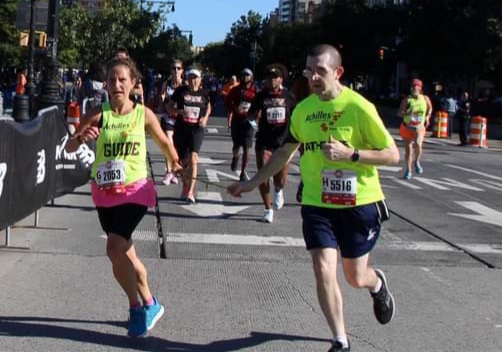Life is a series of challenges. For marathon runner Declan Ryan, the key to overcoming them lies in a simple but powerful phrase: Improvise, adapt, overcome.
It’s a mantra commonly used in the U.S. Marine Corps. Clint Eastwood borrowed it for a line in his movie “Heartbreak Ridge”. Those words have guided Ryan through the loss of most of his vision and his mother’s current battle with cancer.
A New York City native, Ryan was diagnosed with Leber Congenital Amaurosis (LCA), a rare type of inherited eye disorder. While many patients go blind by age 13, Ryan’s vision didn’t begin rapidly deteriorating until age 17. By the following year, only his peripheral vision remained.
Adjusting to vision loss is usually a steep learning curve. But the 31-year-old building superintendent had time to prepare. He also drew inspiration from disabled veterans.
“When they get injured, they don’t have their disability happen over time,” he explained. “It happens right away. If they can overcome what they’ve had happen to them, there’s no reason why I can’t.”
Ryan wasn’t passionate about sports growing up. He played basketball during gym class in elementary and middle school, despite warnings that injury could accelerate his vision loss. He became interested in running in 2009 through Tunnel to Towers, a foundation that honors the sacrifice of firefighters and first responders. As a kid, Ryan’s dream was to be a New York City firefighter, and he enjoyed watching the foundation’s 5K Run.
Ryan convinced his sister Catherine to run the race with him. She agreed, and became his first running guide.

After graduating from Kaplan University with a degree in fire science and emergency management, Ryan posted a message on social media looking for a guide to run marathons. He received a response from Joseph Sorbanelli, head of the New Jersey chapter of Achilles International, an organization that provides athletic programs for people with disabilities.
The two began running in Central Park. One day during a training run, Sorbanelli asked Ryan if he had any running goals. When Ryan expressed interest in running the New York City Marathon, Sorbanelli immediately replied, “you’re doing that next year.”
Ryan had only just begun to train. But Sorbanelli’s prediction came true in 2019, when Ryan completed his first New York City Marathon. Sorbanelli rotated with another guide during the race, and they finished in six hours, eight minutes.
The two of them, plus everybody else with the New Jersey chapter, made the day more enjoyable than I ever thought it could be.
Ryan completed the virtual New York City Marathon in 2020 during the coronavirus pandemic, improving his time to 5:20. In the next few months, he plans to run the Chicago, New York, and Philadelphia marathons. His goal is to reduce his time under five hours.
Last year, Ryan took part in a virtual stair climb fundraiser for the American Cancer Society. His mother Laura was diagnosed with metastatic thyroid cancer, which has spread to her spine, lungs and hip. Her battle has taught Ryan a great deal about perseverance.
I look at my mom and the pain she’s in on a routine basis. When I’m out doing my long runs, whether it’s a half-marathon, 18 miles, 20 miles, I try to channel her strength for when my legs are tired, I’m fatigued, or I just want to relax.
Ryan first came in contact with the Foreseeable Future Foundation while scrolling through Facebook looking for different races throughout the U.S. He decided to apply and was approved in 2019. The funding has made a tremendous difference in allowing him to pursue his dream.
Running all the different races, financially it’s hard when you work as a building superintendent. We don’t tend to make much money, so for them to be the ones that pay for me to do all these different races… It’s meant a lot that I can continue my journey of getting out, seeing these different races and what New York has to offer.
The partnership between runner and guide requires communication and absolute trust. Ryan enjoys the freedom and camaraderie the relationship brings to both blind and sighted individuals. His goal is to eventually hit all the major marathons throughout the country. He has some words of wisdom for anyone struggling to come to grips with vision loss or any disability.
Even though you’re either just now becoming blind or are going to become blind, it doesn’t mean you can’t do the same thing as the sighted world. You just have to figure out a different way to do it. The quicker you learn to improvise, adapt and overcome, the more (you’ll be) successful and the more you’ll enjoy life.
